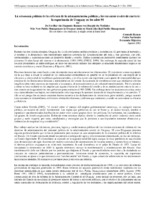Mostrar el registro sencillo del ítem
La economía política de la reforma de la administración pública y los servicios civiles de carrera: la experiencia de Uruguay en los años 90
| dc.contributor.author | Ramos Larraburu, Conrado Ricardo | |
| dc.contributor.author | Narbondo Alvarez, Pedro Alejandro | |
| dc.contributor.author | Filgueira, Fernando | |
| dc.date.accessioned | 2018-09-02T05:19:46Z | |
| dc.date.available | 2018-09-02T05:19:46Z | |
| dc.date.issued | 2002-10 | |
| dc.identifier.uri | http://cladista.clad.org//handle/123456789/2080 | |
| dc.description.abstract | This paper claims that for the case of Uruguay, and probably for most countries in Latin America, New Public Management is not the right medicine for an inefficient State. Furthermore, we claim that New Public Management might very well increase the State deficit in this aspects in the region. | |
| dc.description.abstract | NPM is meant to address problems of political responsiveness, bureaucratic corporatism and rigidity in State structures and decision making. Technical elites and the bureaucracy are extremely responsive to politics in Uruguay (also in Latin America), only that they are responsive through patrimonial and clientelistic practices. The last layer of political appointees in Uruguay (chiefs of executive units), are, as in many other Latin American countries, the key players in a complex and fragmented system of patronage and patrimonialism. | |
| dc.description.abstract | Through the case studies of two major reforms in Uruguay that took place between 1995 and the year 2000 (functional and administrative reorganization of the central government and the reform of the civil service) we show that there is a major gap between the goals of these reforms and their actual achievements. A large part of such gaps can be traced directly to the respect or even expansion of particularistic practices within the central government that affected the implementation of reform. And a large part of the respect and/or expansion of such practices can be plausibly linked to the two pillars of NPM: a managerial approach and a public choice approach. | |
| dc.description.abstract | By choosing the "most likely manager that would also be responsive to political leadership" as the key agent in the reform (the chief of executive units), the reform also chose the gatekeeper of patrimonial structures and dynamics. By attempting to retrench state functions and increase private and third sector organizations as counterparts to the State, the reform also increased the bounty for particularistic practices and collusive behavior between the state and its new partners. By creating high management contracts, and by increasing non-career personnel, it also opened the doors to new clientelistic practices. | |
| dc.description.abstract | Our disease is patrimonialism, and the remedy for such a problem has been in other countries weberian style reforms, not NPM ones. This paper, thus, suggests that there are neither shortcuts nor quick fixes. The fact that our States today tend to show both types of diseases (both patrimonialism and rigidity/corporatism) does not mean that NPM can deal with both of them. A careful strategy to fight patrimonialism within the state requires building civil service careers that are not hollowed out by clientelistic practices and by the geological accumulation of layers of fragmented rules that have been created to legitimize de jure, de facto clientelistic practices. Sequencing reform in such a way that we first achieve bureaucratic models and not the illusion of them, might prove to be necessary, before we think of NPM innovations in the region. | |
| dc.format.extent | 28 p. | |
| dc.language | Español | |
| dc.publisher | Universidad de la República Oriental de Uruguay. Instituto de Ciencia Política. Area de Reforma del Estado | |
| dc.rights | Creative Commons BY-SA-NC 4.0 Int | |
| dc.rights.uri | http://creativecommons.org/licenses/by-nc-nd/4.0/ | |
| dc.subject | CONGRESO CLAD 7-2002 | |
| dc.subject | REFORMA DEL ESTADO | |
| dc.subject | ANALISIS HISTORICO | |
| dc.subject | ADMINISTRACION DE PERSONAL | |
| dc.subject | FUNCION PUBLICA | |
| dc.subject | REFORMA DE LA FUNCION PUBLICA | |
| dc.title | La economía política de la reforma de la administración pública y los servicios civiles de carrera: la experiencia de Uruguay en los años 90 | |
| dc.type | article | |
| clad.congress | Congreso Internacional del CLAD sobre la Reforma del Estado y de la Administración Pública, 7 | |
| clad.key | MFN32167--32167 | |
| clad.key1 | KEY32167 | |
| clad.notes | Se dispone de otra versión con el título "La economía política de la reforma del servicio civil en Uruguay: los años 90", presentada en la Reunión de la Red de Gestión y Transparencia de la Política Pública, 3 "La Reforma del Servicio Civil" (2002 Nov. 14-15: Washington).-BID. Diálogo Regional de Política.-38 p. (versión a octubre de 2002) | |
| clad.region | URUGUAY | |
| clad.md5 | 7fcfc9cc96b3a07dbc1fe958ef616fe5 |


